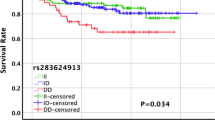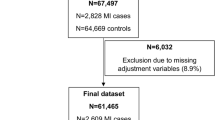Abstract
Cardiovascular disease (CVD) is the leading cause of death in China. This study aimed to investigate whether RAGE gene polymorphisms are associated with the prognosis of various cardiovascular diseases in the Chinese Han population. This study was conducted from July 2004 to December 2005 and a total of 425 subjects from Guangdong province were enrolled. Genotyping of the three polymorphisms (−429T/C, 1704G/T, and G82S) in the RAGE gene was performed with polymerase chain reaction/restriction fragment length polymorphism (PCR–RFLP). Patients were followed for 6.5 years to watch for the development of cardiovascular events and mortality. Subjects with the S mutation of the G82S polymorphism had a significantly higher risk of all-cause mortality and acute myocardial infarction (AMI) than did those with wild-type homozygosity. Logistic regression analysis and Kaplan–Meier analysis all revealed that the G82S polymorphism of the RAGE gene was associated with a significantly increased risk of all-cause mortality and AMI. However, the −429T/C and 1704G/T polymorphisms were not shown to have any effect on prognosis. In conclusion, the G82S variant of the RAGE gene was significantly associated with an increased risk of all-cause mortality and AMI in the Chinese Han population.




Similar content being viewed by others
References
Balasubbu S, Sundaresan P, Rajendran A, Ramasamy K, Govindarajan G, Perumalsamy N, Hejtmancik JF (2010) Association analysis of nine candidate gene polymorphisms in Indian patients with type 2 diabetic retinopathy. BMC Med Genet 11:158
Cipollone F, Iezzi A, Fazia M, Zucchelli M, Pini B, Cuccurullo C, De Cesare D, De Blasis G, Muraro R, Bei R, Chiarelli F, Schmidt AM, Cuccurullo F, Mezzetti A (2003) The receptor RAGE as a progression factor amplifying arachidonate-dependent inflammatory and proteolytic response in human atherosclerotic plaques: role of glycemic control. Circulation 108:1070–1077
Cohen CR, Diel VB, La Porta VL, Rohde LE, Biolo A, Clausell N, Dos Santos KG (2012) Association study of polymorphisms in the receptor for advanced glycation end-products (RAGE) gene with susceptibility and prognosis of heart failure. Gene 510:7–13
Daborg J, von Otter M, Sjolander A, Nilsson S, Minthon L, Gustafson DR, Skoog I, Blennow K, Zetterberg H (2010) Association of the RAGE G82S polymorphism with Alzheimer’s disease. J Neural Transm (Vienna) 117:861–867
Gao J, Shao Y, Lai W, Ren H, Xu D (2010) Association of polymorphisms in the RAGE gene with serum CRP levels and coronary artery disease in the Chinese Han population. J Hum Genet 55:668–675
Hofmann MA, Drury S, Hudson BI, Gleason MR, Qu W, Lu Y, Lalla E, Chitnis S, Monteiro J, Stickland MH, Bucciarelli LG, Moser B, Moxley G, Itescu S, Grant PJ, Gregersen PK, Stern DM, Schmidt AM (2002) RAGE and arthritis: the G82S polymorphism amplifies the inflammatory response. Genes Immun 3:123–135
Hudson BI, Schmidt AM (2004) RAGE: a novel target for drug intervention in diabetic vascular disease. Pharm Res 21:1079–1086
Jang Y, Kim JY, Kang SM, Kim JS, Chae JS, Kim OY, Koh SJ, Lee HC, Ahn CW, Song YD, Lee JH (2007) Association of the Gly82Ser polymorphism in the receptor for advanced glycation end products (RAGE) gene with circulating levels of soluble RAGE and inflammatory markers in nondiabetic and nonobese Koreans. Metabolism 56:199–205
Kalousova M, Jachymova M, Germanova A, Kubena AA, Tesar V, Zima T (2010) Genetic predisposition to advanced glycation end products toxicity is related to prognosis of chronic hemodialysis patients. Kidney Blood Press Res 33:30–36
Li K, Zhao B, Dai D, Yao S, Liang W, Yao L, Yang Z (2011) A functional p. 82G>S polymorphism in the RAGE gene is associated with multiple sclerosis in the Chinese population. Mult Scler 17:914–921
Lu L, Jin PuL, Chen QJ, Wang L, Peng W, Yan X, Zhang Q, Yan Zhang R, Gong PH, Qiu JP, Shen WF (2008) Increased glycated albumin and decreased esRAGE concentrations are associated with in-stent restenosis in Chinese diabetic patients. Clin Chim Acta 396:33–37
Martens HA, Nienhuis HL, Gross S, van der Steege G, Brouwer E, Berden JH, de Sevaux RG, Derksen RH, Voskuyl AE, Berger SP, Navis GJ, Nolte IM, Kallenberg CG, Bijl M (2012) Receptor for advanced glycation end products (RAGE) polymorphisms are associated with systemic lupus erythematosus and disease severity in lupus nephritis. Lupus 21:959–968
Mosquera JA (2010) Role of the receptor for advanced glycation end products (RAGE) in inflammation. Investig Clin 51:257–268
Park SJ, Kleffmann T, Hessian PA (2011) The G82S polymorphism promotes glycosylation of the receptor for advanced glycation end products (RAGE) at asparagine 81: comparison of wild-type rage with the G82S polymorphic variant. J Biol Chem 286:21384–21392
Poon PY, Szeto CC, Chow KM, Kwan BC, Li PK (2010) Relation between polymorphisms of receptor for advanced glycation end products (RAGE) and cardiovascular diseases in Chinese patients with diabetic nephropathy. Clin Nephrol 73:44–50
Ramasamy R, Vannucci SJ, Yan SS, Herold K, Yan SF, Schmidt AM (2005) Advanced glycation end products and RAGE: a common thread in aging, diabetes, neurodegeneration, and inflammation. Glycobiology 15:16R–28R
Vasku V, Kankova K, Vasku A, Muzik J, Izakovicova Holla L, Semradova V, Vacha J (2002) Gene polymorphisms (G82S, 1704G/T, 2184A/G and 2245G/A) of the receptor of advanced glycation end products (RAGE) in plaque psoriasis. Arch Dermatol Res 294:127–130
Volz HC, Seidel C, Laohachewin D, Kaya Z, Muller OJ, Pleger ST, Lasitschka F, Bianchi ME, Remppis A, Bierhaus A, Katus HA, Andrassy M (2010) HMGB1: the missing link between diabetes mellitus and heart failure. Basic Res Cardiol 105:805–820
Xi B, Liu F, Hao Y, Dong H, Mi J (2014) The growing burden of cardiovascular diseases in China. Int J Cardiol 174:736–737
Yan SF, Ramasamy R, Naka Y, Schmidt AM (2003) Glycation, inflammation, and RAGE: a scaffold for the macrovascular complications of diabetes and beyond. Circ Res 93:1159–1169
Zhang HM, Chen LL, Wang L, Liao YF, Wu ZH, Ye F, Xu S, Yi LL (2009) Association of 1704G/T and G82S polymorphisms in the receptor for advanced glycation end products gene with diabetic retinopathy in Chinese population. J Endocrinol Investig 32:258–262
Acknowledgements
The authors above take responsibility for all aspects of the reliability and freedom from bias of the data presented and their discussed interpretation.
Author information
Authors and Affiliations
Corresponding authors
Ethics declarations
Funding
This study is supported by the Guangdong Provincial Department of education “211 Project” project fund, Medical Scientific Research Foundation of Guangdong Province, China (A2015202), and Science And Technology Project of Zhongshan City, China (2016B1056).
Conflict of interest
The authors have no conflict of interest to declare.
Ethical approval
All procedures performed in studies involving human participants were in accordance with the ethical standards of the Institute Research Medical Ethics Committee of Southern Medical University and with the 1964 Helsinki declaration and its later amendments or comparable ethical standards.
Informed consent
Informed consent was obtained from all individual participants included in the study.
Additional information
Communicated by S. Hohmann.
Rights and permissions
About this article
Cite this article
Gao, J., Deng, L., Wang, Y. et al. Relationship between RAGE gene polymorphisms and cardiovascular disease prognosis in the Chinese Han population. Mol Genet Genomics 292, 1139–1149 (2017). https://doi.org/10.1007/s00438-017-1341-1
Received:
Accepted:
Published:
Issue Date:
DOI: https://doi.org/10.1007/s00438-017-1341-1




